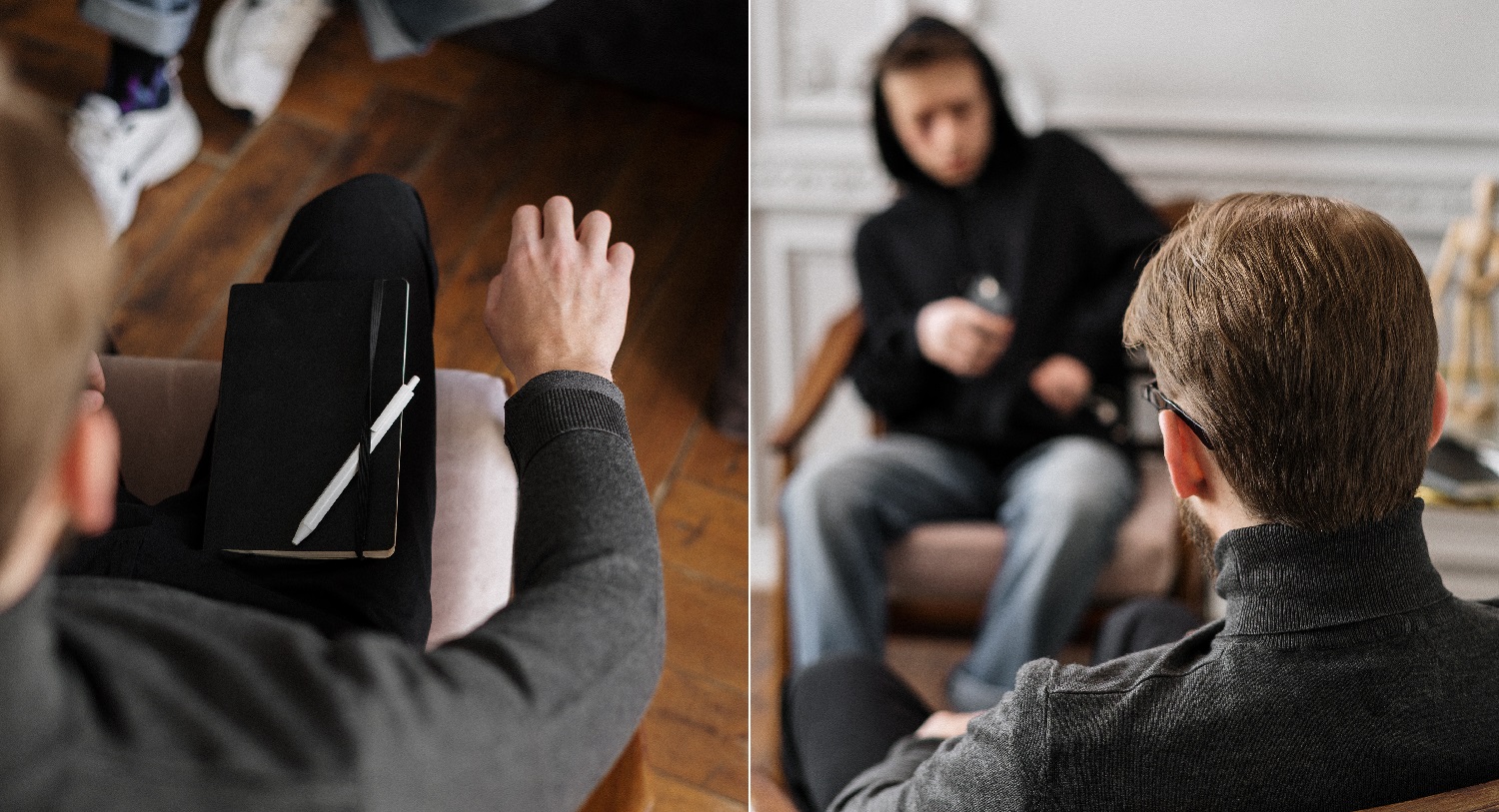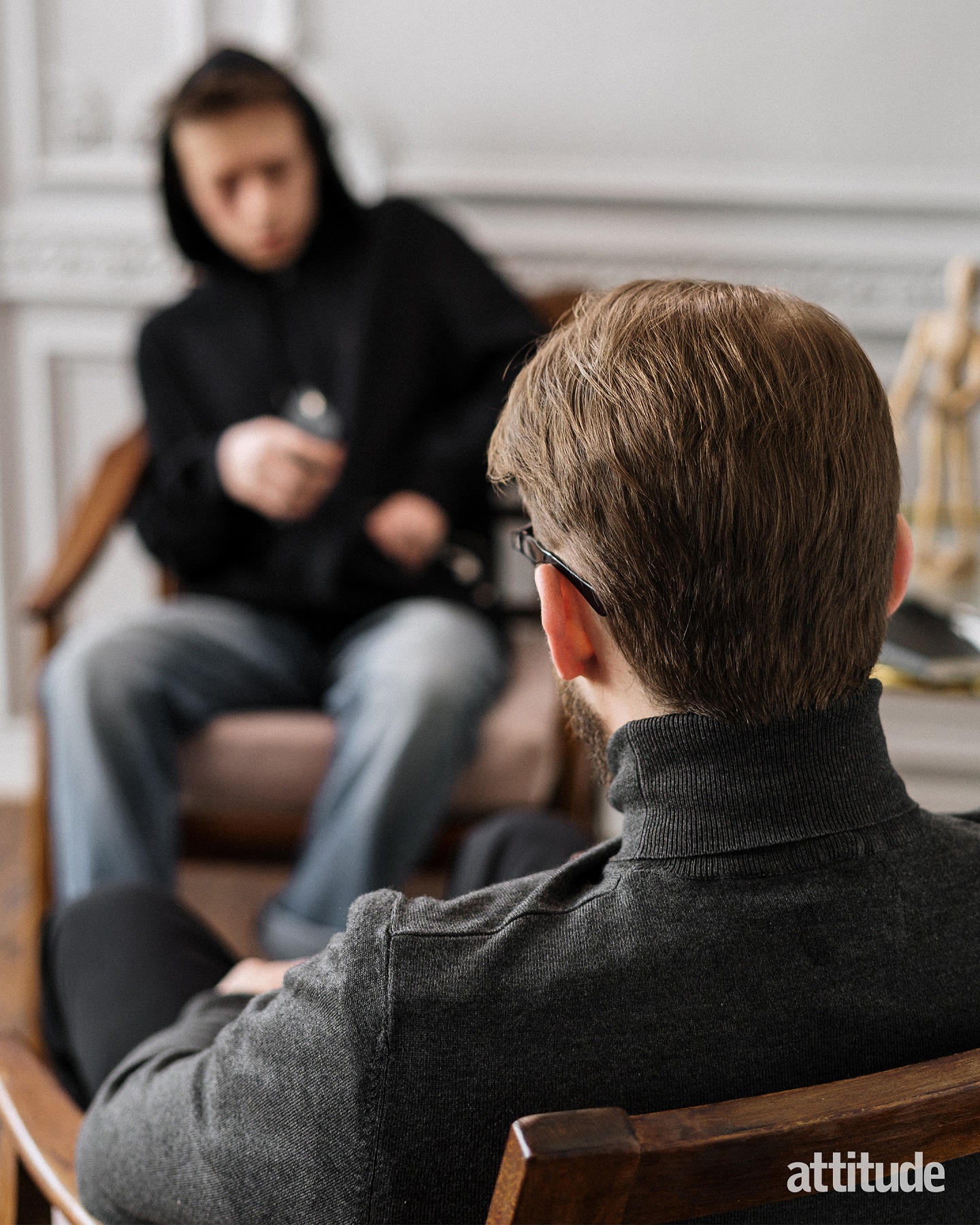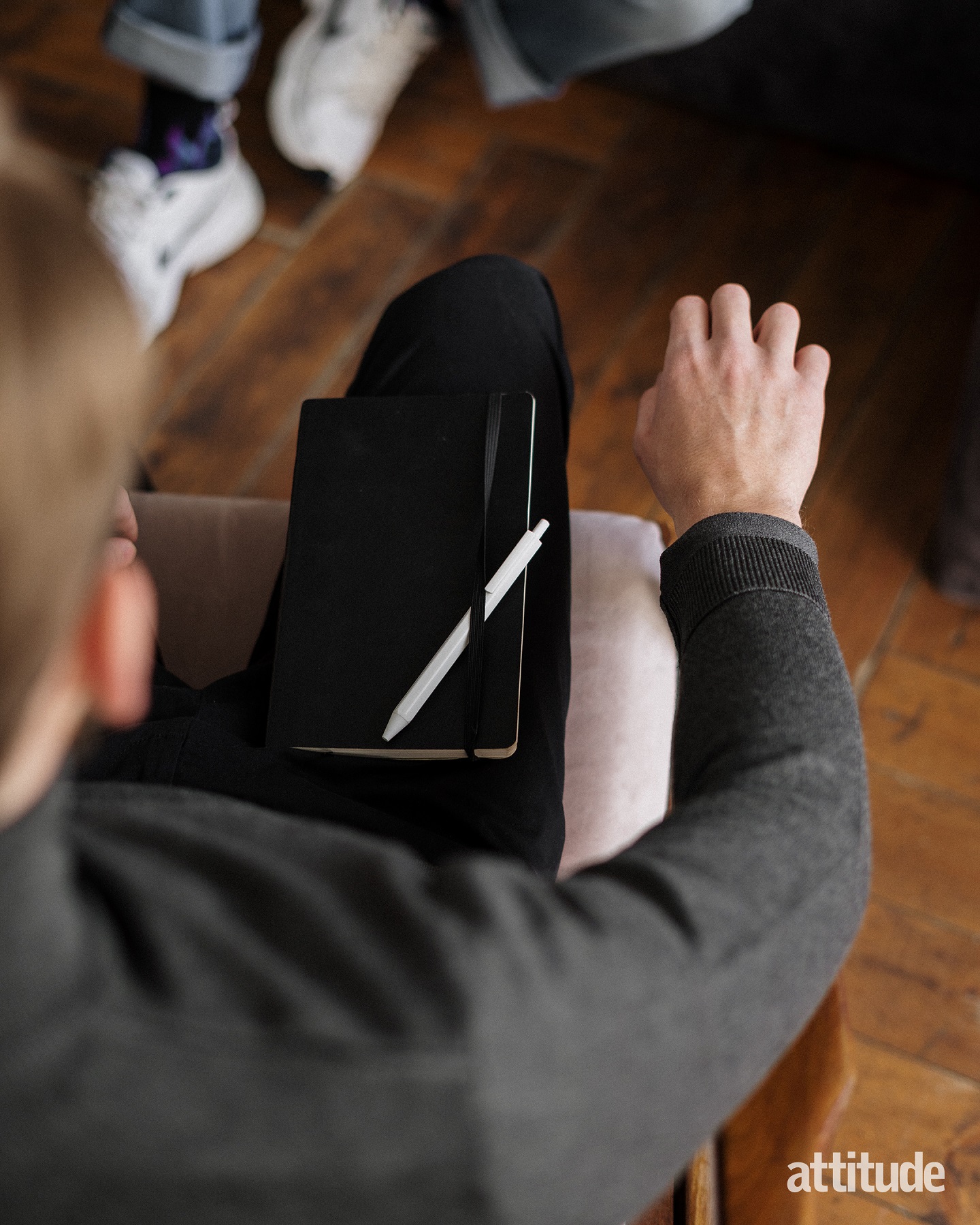‘I was subjected to gay conversion therapy on London’s Harley Street’
Amir (name has been changed), a medical student from London, shares his story of visiting a psychiatrist who claimed he could change his sexuality with medicine.
By Will Stroude

As told to: Thomas Stichbury
The article appears in the Attitude June issue, out now to download and to order globally.
I didn’t have that classic thing of always knowing that I was gay. It was something I came to terms with when I was 16, 17.
There was one person, a schoolteacher, that I knew I liked. I was in admiration of them, and I was really confused: do I want to be like them? Do I just want to be in their company? Then I, kind of, found that, no, I was thinking about them even when I was at home. It dawned on me that, maybe I do have romantic and, I guess, sexual feelings towards this person, which was unfamiliar for me.
Growing up, I didn’t really have sexual thoughts or romantic feelings towards anybody. I don’t know if that was partly to do with my conservative Muslim upbringing; dating is not encouraged, and there is an expectation that you will meet someone from the mosque community.
My family are of Pakistani origin, we speak Urdu, and I don’t know if there is even a word for “gay”. For the longest time, the words that were used were swearwords. One of them was “kanjar” and I think that translates as someone who is sexually promiscuous or immoral, “like an animal”. That’s a slur that is used towards LGBT people, or people that are not very religious and go off the rails. That was their word for “gay”. Ironically, “gay” was seen as a greater swearword. There were such negative connotations.
I remember my dad called me into his room and he sat me down and said, “Your brother said you don’t feel like coming to the mosque. What’s happening?” I said, “I really can’t explain, and I don’t want to go into it until after my A-level exams are done.” He goes, “What have you done?” I replied, “No, it’s more to do with me fundamentally as a person.” He immediately went to saying, “Well, what are you? Some kind of queer?”
He said it so loudly and my mum was downstairs, and I thought she was going to hear. I actually swore at my dad: “Why are you speaking so fucking loudly?!” I was so shocked, and I ran to the door of the room we were in and slammed it shut, so no one would hear. Then I sat in the chair and was like, “Yeah, I think I am.”
My dad and I went for a drive to a park near us. I don’t like going back to that park now, because I’ve got these horrible memories of my dad being so direct and vulgar; like, we’d see people, men cycling, and he would point and say, “Do you want to have sex with them? Is that what you want?” Again, I wasn’t very sexual in my thinking, I was quite naïve and innocent and immature to that sort of thing.
“Look, you’re confused. What about this girl? I thought she was a friend of yours and you’re close?” (At the time, I had become close to a girl who was in my year at school.)
My dad believed that because I was raised in an environment where dating and pre-marital sex was taboo, I felt that I had to compensate, that because I wasn’t comfortable having sex or being intimate with this girl, I had convinced myself that I was gay.
I spoke to a counsellor and I was preparing to go away to university, and I said to my parents, “Maybe you’re right, maybe I am confused.” I didn’t fully believe what I was saying, but it was for their sake rather than my own.
Once I’d met my boyfriend at uni – things were quite serious for, like, two years – I thought, yeah, I need to tell them. The lying and secrecy was getting too much for me.

It was a bank holiday weekend in April, and we’d gone to a graveyard to see some family; it was very emotional and intense. We drove back and I said to my parents, “I need to talk to you about something.” My mum said, “Have you fallen in love with someone?” I’m thinking, how does she know? I said, “Yeah.” “Is it a white girl?” I was like, “It’s a white… man.” Then my dad – again, I don’t know how – goes, “Is he older than you?” “Yeah”. He launched into the narrative of, well, you were groomed, you went to university, an older man took advantage of you.
We had a family GP who was really lovely and supportive, and he was someone that I had confided in before I came out to my parents. He told me that if I was worried about arguments or conflicts, he would be happy to act as a mediator. My mum and dad spoke to him individually and were, like, “He doesn’t understand our culture. I’m not sure if he’s practising any religion, but he’s not Muslim, he’s not Asian, he’s Caucasian.” I think they felt he didn’t get it.
I asked them if they’d prefer to speak with someone they know, like my uncle (he’s not a biological uncle, he is more like a godfather). So, we ended up having that conversation, me, my dad and my godfather. Although he is a nice guy and a really decent person, he was obviously on my dad’s side. His stance was: “Can you not just break up with your boyfriend and tell him you need to focus on your studies?”
My next suggestion was, “Why don’t we find a neutral professional who’s from our background? I think that would be the ideal thing.” My dad went online, and he found this psychiatrist who works on Harley Street. The idea was that my parents would meet him first, and if they needed to see him separately at other times they could, and for me to do that as well, and then we would also meet together.
We had already tried the professional route, we tried the religious route, now this was the combination of both. I thought, great, that’s fantastic. Ultimately, this is a difficult thing for my parents to process, and I wanted someone to be there for them as much as for me. I’ve had a lot more time to process and deal with it, whereas for them it was fresh and new and they’re still grieving the person they thought I was and wanted me to be.
It’s like, who do they have? They had no one to talk to about it, no handbook, no other experiences or examples of situations. My godfather and his wife were the only people that my parents had told. They’re dealing with this huge thing and they’re alone.
I met this guy on Harley Street at 8.30pm. It was raining as well, which really didn’t add to the vibe. He had unlocked the front door and there was no one else in the building, no receptionist; I didn’t clock anything because it was out of hours and I didn’t know how private practices worked.
We ended up going to a basement area. I don’t know if you’ve seen Skins, when Freddy and Effie go to see a psychiatrist – that’s what I thought of. The narrow strip of windows was really high up, street level, and I just felt uncomfortable.
He was a smiley person and he asked me a lot of intimate questions about sex and sexual practices: “Have you done anything with a guy?” “What would you like to do?” “What would you like to be done to you?” “And what about girlfriends?” “Had you been physical with her?” He was nodding and smiling, a “well done” sort of thing. He was almost, like, excited. He went on: “What about porn?” “What kind of porn do you like to watch?” And, again, he was very excited.
Then he asked: “Would you like some medicine that can help you?” I didn’t ask him what the medicine was, but I figured he was talking about anti-depressants. I said, “No, it’s OK,” and he goes, “I can give you some medicine, I can give you some now if you want.” He reached into his drawer to get, I presumed, a prescription pad, and I repeated, “No, no, it’s fine.” We moved on to talking about politics and he said, “When I was at university, I was very liberal and I used to follow this party, but as you grow older, your views change. Sexuality is basically like a political party and your political views can change.” He said again, “Would you like some medicine?”
The weirdest thing is, I left there at 10.30pm and the session was supposed to be from 8.30pm to 9.30pm. I felt so tired, mentally and emotionally. I had to discuss things with someone that I hadn’t even discussed with myself. I hadn’t done such a detailed exploration of sexual preferences or acts or any of those things. It was only as I got through my medical training more that I realised how inappropriate it was for him to extend the session by an hour. Thinking back on it, I feel like he was trying to wear me down.

Thankfully, I’ve not had to experience any sort of physical or sexual trauma as such, but the word “assault” really does play in my head. I don’t want to invalidate other people that have had experiences where things have been physical – but it felt so invasive. I felt vulnerable and violated, like the most insecure parts of me were exposed. I’d effectively been told by a medical professional, “What you are doing is fucked up, what you are is a mistake,” and that left me conflicted for a long time, especially when it came to seeking help for my mental health.
Professionally, I have a fear of working with South Asian colleagues, and colleagues from religious, Muslim backgrounds. You have this notion that people are progressive, people are educated, people are taught in a medical environment to be non-judgemental – and yet they still hold these views.
I’ve been trying to find the psychiatrist’s contact details, but I haven’t found his website and stuff since. It’s worrying to think that given Harley Street has the reputation of being a centre of excellence internationally, it could be being used as a destination for conversion therapy for international visiting clients, particularly from the Gulf and Middle East states.
My parents didn’t know any of this was going to happen. They weren’t expecting someone to make me feel upset. They wanted someone to help us. But what I realised as well is, they didn’t send me to see a therapist for him to help me process being gay. There was an element of, “We want someone to tell us we’re right.”
My mum and dad have come a long way since then. They’re still not OK and on board with it, but I think they’ve accepted that all they can do is pray for me. There is also this notion of, if they have a health scare, it’s my fault because underlying everything is their constant fear as to what I’m doing, where my life’s going, and the shame it’s going to bring to everyone. It’s difficult.
They say, “We love you”, and I do get very confused as to what that love means. I’m really grateful in that I’m supported financially for university, but it’s like, I need more than just monetary support. I need that emotional support and understanding. At least they acknowledge that I have a boyfriend. My parents won’t say his name, and I won’t say his name around them, but I’m happy to say to them, “I’m seeing him today” or “I’m staying with him for the Christmas holidays” or whatever.
Sometimes I think it would be easier if they just cut communication. At the root of this whole conversion therapy was the idea of closure, of finding a grey area, a middle ground. The fact we still don’t have that has been toxic.
It was a very upsetting period of time, but it did push me away from my family in the sense that I could have the space to form my opinions and beliefs, “Right, if that’s what they truly feel, how am I going to deal with this myself?” I figured out that, actually, I’m OK with this, and there are people who support me, and there is a loving environment for me to go to.
Anything to do with LGBTQ+ issues is so taboo amongst certain communities. They can’t talk to anyone about it and there aren’t resources and forums for them, both for the individual and the families involved. The psychiatrist abused not only my trust, but my parents’ trust as well, because they didn’t know who to turn to.
I didn’t realise that was conversion therapy. It was only when I saw some posts on Instagram saying that it can be quite subtle; it doesn’t need to be violent or involve electric shock therapy. It is so important for the government to understand that the support is not there for anyone going through this from particular backgrounds, and that these things happen so covertly.
I appreciate this Ban Conversion Therapy campaign for existing, and for people to share their stories of what’s really happening. I know it’s something I would have appreciated coming across and reading in my teenage years, and I hope that someone can see this and think, this is what happened to me, or this is what happened to my family, because it’s more prevalent than people know.
It is so crucial for this to be talked about from a government perspective, from a medical perspective, from a social perspective.
The Attitude Sex & Sexuality issue is out now.
Guarantee your François Sagat or Reno Gold cover in print by subscribing here using either code FRANCOIS or RENO.
Subscribe digitally to the Attitude mobile and tablet edition for just over £1.50 per issue (limited time only).

